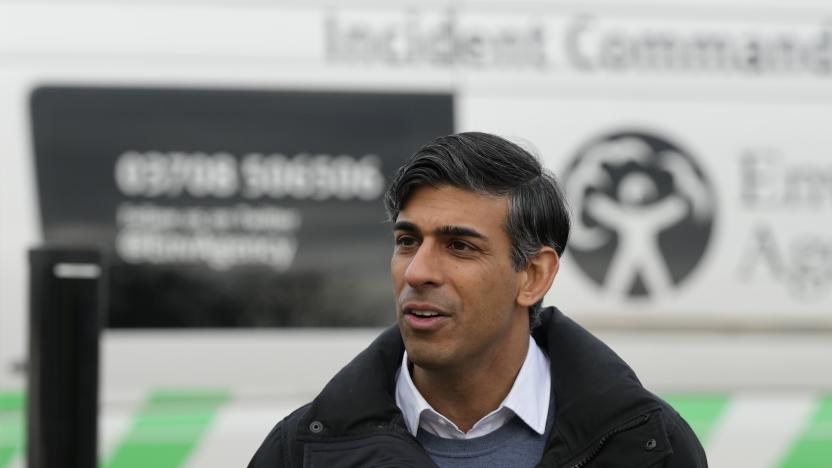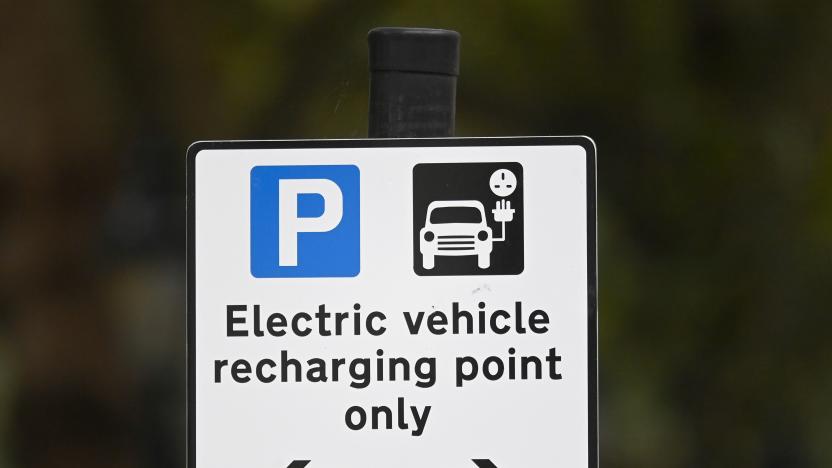uk government
Latest

UK government wants to use AI to cut civil service jobs
The UK government is piloting two AI tools that could help with routine tasks and responses.

UK promises a network of 300,000 EV chargers by 2030
The government hopes the £1.6 billion plan will reduce the country's reliance of foreign energy sources.

The UK buys a 45 percent stake in broke satellite startup OneWeb
It's part of the government's post-Brexit plan to replace the EU's sat-nav system.

UK wants telecoms regulator to police social media companies
The UK government wants to put Ofcom in charge of regulating social media. Digital secretary Nicky Morgan and home secretary Priti Patel said they were "minded" to appoint the watchdog due to its experience and "proven track record" overseeing the UK's media and telecommunications industries. It would also avoid regulatory fragmentation, Patel and Morgan said, and be quicker to set up than a new regulator. Ofcom will be granted new powers to carry out its expanded responsibilities, which will cover any platform that hosts user-generated content, including comments and forum posts. It's safe to assume that social media giants including Facebook, YouTube, Twitter and TikTok will be in its cross-hairs, then.

UK will hold social networks accountable for harmful content
The UK government plans to penalize tech companies like Facebook and Google that fail to curb the spread of harmful content on their platforms. As promised, the country is seeking to empower an independent regulator to enforce the rules which target violent material, posts encouraging suicide, disinformation, cyber-bullying, and child exploitation. Over the coming weeks, the government will consult on the types of punishments available to the new watchdog, including fines, blocking access to sites, and holding senior members of tech companies accountable for their failures.

The UK is expanding drone no-fly zones around major airports
Just a couple of months after drone sightings grounded flights at one of the UK's busiest travel hubs, the nation is expanding drone no-fly zones around airports. As of Wednesday, the no-fly radius is widening from one kilometer to five kilometers (around three miles).

NASA works with UK government to help manage drone traffic
As more drones take to UK skies, the government has called on the biggest name in aerospace to reduce the number of accidents caused by wayward UAVs. It's teaming up with NASA to build and test new tracking systems that can manage both public and private flights, ensuring hobbyists and commercial drone operators don't get in each other's way. "The Government are in early discussions with NASA about the drone traffic management system," said Department of Transport Minister Lord Tariq Ahmad at the House of Lords. "It is hoped that those discussions will lead to a UK involvement in the development of that system and the participation of UK industry in future trials to test the robustness of the technology."

UK government department swaps Microsoft for Google
For the longest time, the UK government built its systems around Microsoft software. That's still largely the case, but things have slowly changed as departments get to grips with the cloud, and companies like Google have planted their flag. The Register reports that Her Majesty's Revenue and Customs (HMRC) has decided it's time to make a clean break and has embraced the search giant's cloud services, becoming the first major UK government department to shift away from Microsoft.

UK game devs start to claim 'culturally British' tax breaks
Developers across the UK are donning their Union Jack dresses and piling up on their tea stocks, now that they claim the long-campaigned for "culturally British" tax breaks. We jest of course, but as of this week, qualifying studios are able to claim up to 25 percent on 80 percent of their production costs, a huge change that trade association TIGA believes will lead to £188 million (around $312 million) in additional investment into the national games industry over the next five years. The still bizarre fulcrum in all this is the Cultural Test itself, which was a sticking point for the European Commission who sees it as vital to the aid. As the EU Commission put it in March, "the proposed cultural test ensures that the aid supports only games with cultural content without leading to undue distortions of competition."

Online ticket companies could soon face the music over expensive booking fees
Nothing beats going to watch your favourite singer or band play live. UK ticket companies know this, so they've been penalising by charging exorbitant booking and delivery fees for years. That practice could soon be brought firmly into the spotlight, however, thanks to consumer pressure group Which?. The Guardian reports that the charity has given online ticket companies until Wednesday to explain the reasons behind their high mark-ups, which, on average, add 18 percent to face-value ticket prices, or it'll refer the evidence it's been collecting on them to the UK's Competition and Markets Authority. It's highly likely the sellers will choose to remain silent in the face of criticism, but we may finally understand why these so-called fulfilment fees, transaction fees and service charges are appearing when we buy tickets online.

UK to introduce new road laws allowing the use of self-driving cars
Not to be left behind by developments in the US, the UK government is set to rewrite road laws to allow self-driving cars on Britain's roads. According to Mail Online, science minister David Willetts has already opened discussions with the Department for Transport to help British companies develop their own driverless cars and encourage the world's car companies to do the same. Willetts' comments come just weeks after Google showed off its new self-driving prototypes that don't come equipped with a steering wheel, mirrors or pedals. As we've noted before, laws covering driverless cars are still new, with only a few US states, including California, Nevada, Michigan, Florida and the District of Columbia, giving them the green light (but require someone to sit in the passenger seat, at least for now). The UK government aims to follow suit, allowing researchers at Oxford University, who have pioneered a cheaper version of Google's self-driving tech, to legally test different driving scenarios on (hopefully quiet) British roads.

UK's National Archives now saving tweets and YouTube videos as historic media
Already home to the UK's most iconic national documents from the last millennium, The National Archives is expanding its digital collection by going social. It's begun archiving tweets and YouTube videos published by the UK's ruling parties over the last decade, permanently preserving them as the official public record. Unlike in the US, where the Library of Congress has set about archiving all of America's tweets (and has already collected more than 170 billion messages), the National Archives' sights are firmly set on government accounts. While that may include mundane social updates from the Forestry Commission, HM Revenue and Customs and the Office of Fair Trading, the Archive will also preserve moments of national pride: events including the 2012 London Olympics, the birth of Prince George and the Queen's Diamond Jubilee have all been saved in the digital vault. Right now, the collection includes 7,000 YouTube videos and more than 65,000 individual tweets -- it has the capacity to collect 3,200 tweets at any one time, though, allowing you to trawl announcements of past environmental heath issues, premium bond interest rates and possibly a future British Wimbledon winner at your leisure.

UK government will unblock websites after adult filter blunder
Shortly after the UK government implemented a nationwide adult content filter, it transpired that it wasn't just naughty sites you couldn't access. Copyright blogs, relationship education sites and even women's crisis centers were all marked as being dangerous for family viewing. After much hand-wringing, the government has admitted the error, and is now working on a whitelist of sites that shouldn't be censored. At the same time, there are plans to develop an appeals system -- so that we can all go back to reading about James Earl Miles Jr. without fear.

UK government and industry heavyweights set up 5G Innovation Centre, want to go one better
The UK is almost ready to flip the switch on its first LTE network, but it's determined to be at the forefront of the next-generation, setting up a "5G Innovation Centre" at the University of Surrey. The government announced it's putting up £11.6 million (around $18.6 million) in funding, but another £24 million (around $38.5 million) will be coming from an industry group comprising the likes of Huawei, Samsung, Telefonica, Rohde & Schwarz, Fujitsu and others. The money will allow research to go beyond concept and theory, with the aim that all partners work together to develop and standardize 5G technology, which the university has been looking into for a number of years already. They will focus on energy and spectrum efficiency as well as speed, and although it's early days, 10Gbps has been banded around as a per-tower target, translating to roughly 200Mbps for each connection. Unfortunately, we've also got a number to kill your geek buzz -- it's upwards of a decade away. Still, at least you've got a long time to think about which case you'll be picking up for your 5G-ready Galaxy S XV.

UK planning second snooping bill, proxy servers to sell out shortly
The UK Government revealed on April Fools' Day that it's planning to offer law enforcement agencies unprecedented access to private communications. British Cellphone operators and ISPs will be required to harvest packet data -- containing the parties to all calls, emails and social media communication, as well as the time and duration of each message. The proposals will be officially unveiled on May 9th, as part of the Queen's Speech, despite a similar bill being opposed by the current administration whilst it was in opposition. It has already drawn bitter criticism from backbench members of the Government, civil liberties advocates and privacy experts, who believe the move is fundamentally flawed. It's currently timetabled to be added to the statute books by 2013, unless, you know, common sense gets in the way.







